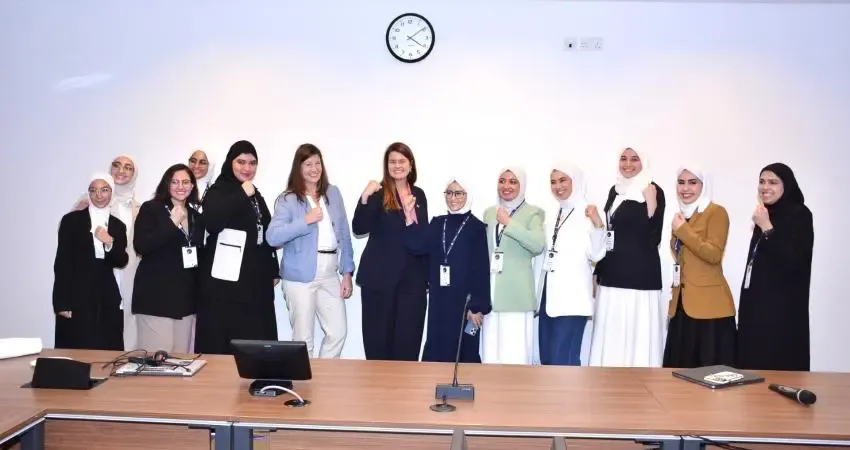
College of Science at Kuwait University Hosts Representatives from NASA to Discuss Potential Space Collaboration
In an effort to enhance international collaboration in space exploration, developing capabilities, and exchanging expertise, Kuwait University; represented by the College of Science, welcomed a research delegation from NASA. This visit was supported by the Kuwait Foundation for the Advancement of Sciences and was coordinated between the Kuwaiti Ministry of Foreign Affairs, specifically the Department of Americas Affairs, and the U.S. Embassy, represented by the Office of Military Cooperation. The event took place on Saturday, October 19, 2024, at the College of Science in the southern campus of Sabah Al-Salem University City. The aim was to benefit from fruitful experiences in research and knowledge exchange. Attendees included Assistant Dean for Academic Affairs, Research, and Graduate Studies; Prof. Susan Al-Bustan, Acting Head of the Physics Department and Director of the National Project for the First Kuwaiti Educational Satellite; Dr. Hala Al-Jassar, Acting Head of the Department of Earth and Environmental Sciences; Dr. Feryal Bourbeau, faculty member in the Electrical Engineering Department Dr. Yasser Abdulrahim, and Anfal Al-Linqawi, Head of the KuwaitSat-1 Applications Department.
Representing NASA were Casey Swails, Deputy Associate Administrator, and Katherine Hamilton, Public Affairs Officer, along with several members of the U.S. Embassy in Kuwait.
In this context, Dr. Hala Al-Jassar, Acting Head of the Physics Department at Kuwait University and Director of the National Project for the First Kuwaiti Satellite, confirmed that the visit by the American delegation aimed to enhance collaboration between Kuwait University, particularly the College of Science, and NASA in the areas of research, education, and training. This initiative aligns with the vision of His Highness Sheikh Mishal Al-Ahmad Al-Jaber Al-Sabah, the Amir of Kuwait, emphasizing the importance of advancing research through the exchange of expertise and the development of joint programs. This reflects Kuwait's commitment to progress in the space sector, reinforcing its position as an important partner in the global landscape of space exploration and scientific inquiry.
Dr. Yasser Abdul Rahim, faculty member in the Electrical Engineering Department at the College of Engineering and Petroleum, noted that this visit was coordinated with the Kuwaiti Ministry of Foreign Affairs and the U.S. Embassy in Kuwait. He explained that Kuwait University's participation stems from its role as a research and training institution for students, supported by programs from the Kuwait Foundation for the Advancement of Sciences, particularly the National Project for the Kuwaiti Satellite KuwaitSat-1. He indicated that this coordination meeting aims discuss areas of collaboration between Kuwait University and NASA concerning space technology and student training, with plans to establish several programs that allow students to exchange various experiences related to the field of space.
For her part, Prof. Suzanne Al-Bustan, Assistant Dean for Academic Affairs, Research, and Graduate Studies, confirmed that the meeting was coordinated with the Kuwaiti Ministry of Foreign Affairs and the U.S. Embassy to discuss opportunities and points of dialogue for collaboration in the field of space research. She added, "There will be a meeting with female students from the College of Science at Kuwait University across its various departments, featuring a presentation that showcases all the capabilities and technological advancements available at the College of Science, as well as how to leverage them in the fields of science, technology, engineering, and medicine." She expressed hope that this coordination meeting would yield fruitful recommendations to open the door for collaboration between Kuwait University and NASA, in line with the desired objectives that align with Kuwait Vision 2035.
For her part, Casey Swails, Deputy Associate Administrator of NASA, praised the collaboration between the Kuwaiti Ministry of Foreign Affairs and Kuwait University in light of this official visit, which aimed to discuss Kuwait's interests in space and to renew communication regarding space policy. She added, "This meeting is expected to contribute to making decisions about the current and potential space collaboration between Kuwait and the United States."
Swails noted that the U.S. Embassy indicated that the meeting's agenda included reviewing U.S. space policy, with participation from the Office of Military Cooperation at the U.S. Embassy in Kuwait. The aim was to understand Kuwait's space policy and any efforts to formulate and develop that policy. She emphasized that this coordination meeting was intended to discuss opportunities for collaboration between NASA and the relevant Kuwaiti entities, as well as the Artemis Agreement.
Hussain Al-Mousa, a representative from Kuwait Petroleum International and a member of the KuwaitSat-1 technical team, stated that the role of the KuwaitSat-1 in international forums reflects its technical and technological profile as it represents the national project for Kuwait's first satellite, managed by a crew from Kuwait University. Supported by the Kuwait Foundation for the Advancement of Sciences, the project involves several volunteer teams, including the technical team, administrative team, and applications team. Their goal is to capture images using KuwaitSat-1, upload those images, and disseminate them across various social media platforms.


 Colored
Colored Grayscale
Grayscale

